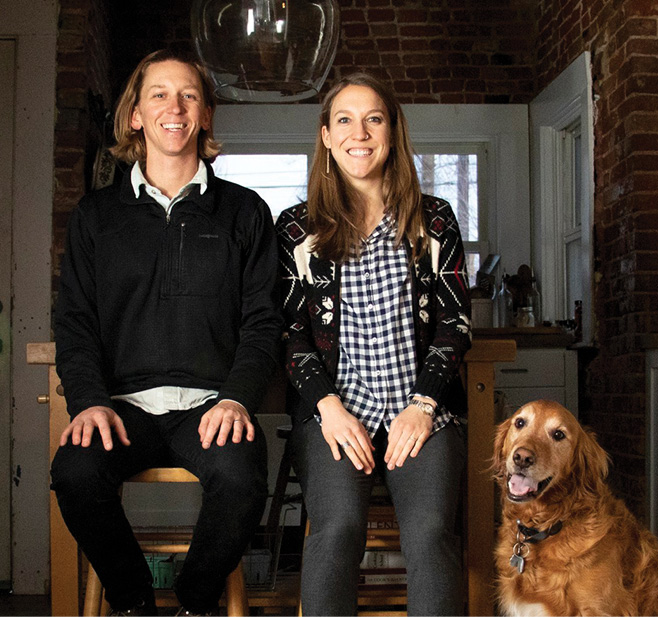A Place to Call Home
Cole and Kaylanne Chandler address homelessness in Colorado
Homelessness is an issue that Cole and Kaylanne Chandler are passionate about. Kaylanne, B.S. ’11, B.S.N. ’12, is a nursing director for a healthcare-for-the-homeless organization in Denver. Additionally, she helps lead a citywide task force that addresses the healthcare response to COVID-19 among the city’s more than 5,000 homeless citizens. Meanwhile, Cole, B.S.Ed. ’10, M.Div ’13, is co-founder and executive director of Colorado Village Collaborative, or CoValleyCo. The nonprofit organization has built two tiny-house communities in Denver in an effort to help the city’s homeless transition from living on the streets to stable housing.
“As a person of faith, there’s a biblical mandate to care for the ‘least of these,’” Cole said. “Even in my work in homelessness, I’m trying to find the most forgotten, most left out person in this work, and that’s the person that I’m trying to serve. That is a commitment that comes from a deep faith commitment.”
Kaylanne, in explaining the factors that contribute to homelessness, said homelessness is an absolute poverty of relationship.
“If I lost my job today, I have Cole. If he lost his job, we have my parents that live right down the road, or we have Cole’s parents who live right down the road,” Kaylanne said. “We have layers of people that support us. If something happened to them, I have my aunt and uncle right down the road and my grandma. At the end of the day, if somebody is experiencing homelessness, it’s because they don’t have anyone. There’s no one. At the root of what we are doing, there is this central desire to support the building of community and support the health of people.”
The Chandlers credit the Christian Ethics class they each took at Baylor as being formative to identifying their calling to serve the poor and marginalized. Jonathan Tran, Ph.D., the George W. Baines Chair of Religion and associate professor of philosophical theology, taught the course, which emphasizes introspection through the lens of faith and ethics.
Kaylanne said Baylor is rooted in the value of community. She said the University helped her find her vocation and form her values. It was at Baylor that Kaylanne answered the questions about her identity and her beliefs.
“These questions from our ethics classes and mythology classes — all of these disciplines come together,” she said. “Baylor was the environment that fostered conversations and embedded those values into people.”
In addition to their tiny home villages, CoValleyCo recently announced the creation of two “safe outdoor spaces” for the city’s unsheltered citizens with support from the City of Denver. After much work and many failed sites — the product of NIMBY (not in my backyard) community backlash — the spaces will be located in the parking lots of the First Baptist Church of Denver and Denver Community Church. The spaces will provide secure camping sites, complete with bathrooms, drinking water, COVID-19 testing and other healthcare and social services for about 80 people. Kaylanne continues writing the strategic plan for the city’s approach to providing healthcare for the homeless through the spring.
“In spite of all the challenges presented by COVID-19 and that are exacerbated for people experiencing homelessness that are forced into congregate settings, Kaylanne has led a city-wide effort to deliver the highest possible healthcare to this population,” Cole said. “They’ve stood up auxiliary shelter systems and clinics, they’ve created a symptom screening protocol, testing protocol. They’ve found eight hotels to provide isolation rooms for people who test positive so that they’re not in a congregate shelter. None of this infrastructure existed at all. It’s been cool to watch that system get created under her leadership.”
With so many challenges and with so much work to do in the face of need, Cole said that their faith continues to carry them through.
“I think of the work we do as hospice care, which is sad,” Cole said. “The reality is that we aren’t going to transform things upstream by providing COVID-19 testing and tiny homes and tents. The reality is that we are trying to bring basic dignity to people that have fallen through the cracks of our society. That’s hospice care.
“In those human interactions, in that deep care for one another, we have a taste of the kingdom of God. We’re working to try to bring that world about on the face of this Earth. Even though we’re doing hospice care, we’re seeing the depth of humanity and the human experience that, if we were all awoken to, we could all be made new.
